Part 6
More of the same in East Molesey
1879-1884
According to the "Life, Times and Writings" preface, published in 1886, his
work in Devon "had precluded the idea of carrying out the proposal of
composing a new biography of the celebrated Church Historian. But the
writer never laid aside the intention which had been formed in his
undergraduate days at Cambridge, and through life he had been collecting
his materials. A change of residence during the last five years, bringing him
within easy distance of thetreasures of the British Museum, has enabled
him at last to externalise this desire."
East Molesey, a parish he visited and liked before taking up the incumbancy,
onhis own admission at first was a most welcoming parish. Whether it was
the distraction of his parallel literary career or just being a parish with a
disinclination to be subject to the autonomy that he was used to wielding
in rural Devon, he soon fomented the parish to quite public rebellion in the
running of his new domain. We get a brief hint that things might no longer
be entirely going to his plan when the following appears in the
April 23rd 1881 issue of the Surrey Comet:
EASTER FESTIVAL AT ST. PAUL'S. - In this Church the decorations were very
beautiful and the services fully choral.The hymns were 125,and 134, and the
anthems, "I know that my Redeemer Liveth" and "Sing a Song of Praise"
(Stainer). The services were intoned by the Rev. Morris Fuller,M.A. The
offertory was taken as an "Easter Offering." andincluded a sealed packet
containing £5, with the words "from one who is glad of the opportunity of
showing appreciation to their vicar."
The following year, 1882 everything came to a head around the Easter Vestry
which was subject to several postponements:
Surrey Comet April 29th:
THE VICAR OF ST. PAULS AND HIS PARISHIONERS
At the adjourned vestry meeting, held on Tuesday evening, there was a
larger attendance of pewrenters than usual. Mr W. Davenport was voted
to the chair, in the continued absence of the vicar. A discussion arose on
the wardens' accounts, and on the application of a reserve fund to the
general expenditure, and the audit was adjourned for explanations from
the vicar. Mr. Gillum, the vicar's warden, read a letter from the vicar,
dated Easter Monday, re-appointing him his warden, and Mr Scott of
Palace- *** , was appointed parish warden. The vicar having in his
letter stated that he would no longer be bound by the resolution passed
(with his concurrence) last Easter for the appropriationof the church
offertories, but would exercise what he deemed his legal right to have
offertories for any purpose he might desire, a resolution in terms of
that now repudiated, was again passed unanimously. Complaint was
made that noticeswere given of services to be held at the church,
and on the inhabitants attending they found the church closed, and no
minister in attendance, Discussion took place as to the pew rents
being (in accordance with law) paid to the churchwardens, and not to
the vicar as heretofore. The vestry adjourned to Tuesday next in hopes
of obtaining the vicar's attendance.
Surrey Comet May 6th 1882
Reply to Vestry Meeeting Report
THE VICAR OF ST. PAULS AND HIS PARISHIONERS
TO THE EDITOR
Sir,- My attention has been called to a paragraph with this heading in your
impresssion of Saturday last (April 29), to the effect that at the adjourned
vestry meeting complaint was made that notices were given of services
(plural number, sic) “to be held at the church and on the inhabitants
attending they found the church closed, and no minister in attendance.”
As this statement, if not contracted, is calculated to affect my official
reputation, will you allow me to say that it is utterly and entirely false.
Notice was indeed given of a service to be held by my locum tenens
(during my long and continued absence in Scotland of one fortnight)
on St Mark’s Day, April 25th, but when the day came, he was too ill to
appear, and it was too late to provide a substitute. But this has not
occurred before, nor is it likely to occur again. Even supposing it had,
it would not have put many inhabitants to inconvenience, for the
services on weekdays are miserably attended, consisting, as a rule,
principallyof members of the family of the present, or late, vicar.
Two or three ladies of the congregation may occasionallyput in an
appearance, “once in the blue moon” (as the saying is), when it suits
their sweet wills and convenience: but as the poet Campbell says,
like “angel’s visits,” they are “far and few between” and comet -like
in their irregularity and excentricity, they flash through the
ecclesiastical firmament. And as for the gentlemen (who make
complaints in vestry),they are as a matter of course (with one
Honourable exception), conspicuous by their absence. Such is the
melancholy condition of our week-day congregation, so there is little
a priori probability of inhabitants being inconvenienced; and while
we, the clergy, may lament the small and almost microscopic
encouragement given us by the laity in our suburban churches in
these days of increased spiritual activity and light, we must fall
back upon the reflection ( as our solatium) that we are brought in
contact with the practical life of this busy 19th century, and this life
correlated with the metropolis, and not with some Utopian dream
of mediaeval ecclesiasticism. To show your readers, however,
what cause the inhabitants have for complaint, we may be allowed
to tabulate the list of the services for the last six months, as a
sample, that is from Michaelmas 1881, to Easter 1882, or
26 weeks.During this period there have been given at St Paul’s
celebrations of Holy Communion, 44; Sunday services 83; and
week-day services, 185 - making a sum total of 268; and 64 sermons
were preached.The legal number of services required to be performed
by a beneficed clergyman during that period as laid down by the law.*
and acknowledged by the archbishop and bishops in their Upper
House of Convocation (on a recent occasion) would have been
celebrations, if quarterly, 2, and if monthly, 6 (this depending on
custom mos pro lege); services 52; and sermons, 26 (preached at
mattins). This brings out the following result in my favour for the
six months: Celebrations, 44, against 6 or 2 (as the case may be);
services 268, as against 52; and sermons, 64 as against the 26
prescried by law. These figures (especially remembering I am
single-handed) I venture to think speak for themselves, and sufficiently
dispose of the complaint of the “Aggrieved Parishioner,” who poses,
martyr-like, in your columns of the 29th ult. on behalf of his confreres,
and they represent proportionably and approximately the number of
services performed during my incumbency of 31/2 years. But I will
take steps that he will not have even a chance of complaint for the
future.
Yours obediently
THE VICAR OF ST PAUL’S.
St Paul’s Vicarage, East Molesey by Hampton Court May 4th 1882
*Bennet and Bonnaker, 1 Hagg.25, 57 Geo III., c. 09
Surrey Comet May 13 1882
THE VICAR OF ST. PAUL’S AND HIS PARISHIONERS.
Sir. —A newspaper is perhaps not the best medium for discussing unhappy
differences between a minister and his parishioners, but the strangely
intemperate and flippant letter from our vicar that appeared in your columns
last week calls for some notice. All thoughtful persons most have felt great
regret that a minister of the Gospel could have written in such a spirit and tone
on matters relating to his church and parishioners, and I think on its perusal
theycannot be surprised to hear that the attendances at the dally services
are reduced to the "members of his own family, two or three ladies once
in a blue moon when it suits their sweet wills, &c, and of the men only
one honourable exception.” A hard dictum that the only honourable man
among us is he who attends these services. The vicar does not comment
on his Sunday services.which on his advent were so fully attended, that
he deemed it necessary to largely increase the sittings, while now the
church is generally half empty andthe offertories fallen to a point
insufficient to properly maintain the church and its services. But a few
words on the statements made by the vicar. I will not discuss the
complaint referred to; that will be met the vestry: but while giving
a flat contradiction to that complaint, the vicar makes a statement which
appears, I wont say (in his words) "utterly and entirely false,” but misleading.
He says "Notice was given of a service to held by my locum tenens during
my long and continued absence of one fortnight."
Now, as matter of fact, the vicar left on Easter Monday and returned late
on the following Friday fortnight, being nearly three weeks; and as his
allusion to his “locum tenens during that time" may lead people to believe
he left a minister in charge of his parish, I must state that this was not so.
There was no one in charge, nor any arrangement made with any
neighbouring minister to perform any the parish ministerial offices,
visiting of sick, &c., but simply a stranger engaged to perform the
Sunday services, and this I think the vicar will not say has been
a single or exceptional case during his incumbency. And now, sir,
what does that great flourish of trumpets at the end of his letter
amount to? He tells how many services he has given and how many,
by an old Act of Geo. lII, he was legally bound to give. I will not enter
upon the alterations and additions that in practice have taken place
with regard to services and sermons in all churches during the last
50 years, but I will put it to the vicar in this form : Did he not seek this
church, visit it, make inquiries and ascertain the number and nature
of the services? Did he not express himself not only satisfied, but
pleased with them, and did he not publicly express that feeling and
say that he would make no alteration in them? If this be so, does he
not feel that he entered into a tacit and honourable agreement with
his patron andhis bishop to continue those services, or does he think
he is “ exceptionally honourable ” if observes the engagements he
undertook? I will only add that I trust he will try and meet his
parishioners in a spirit worthy of the holy office he holds, and If so
I am sure he will be met by them with a desire to assist and
support him in his work.
Yours obediently, AN OLD PARISHIONER. East Molesey, 10th May, 1882
And then came the meeting itself, published in full on May 20th again in the
Surrey Comet:
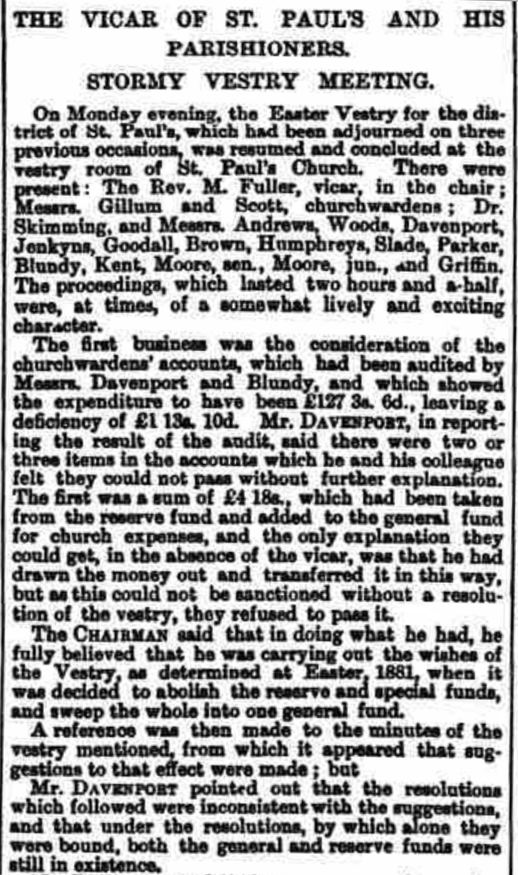
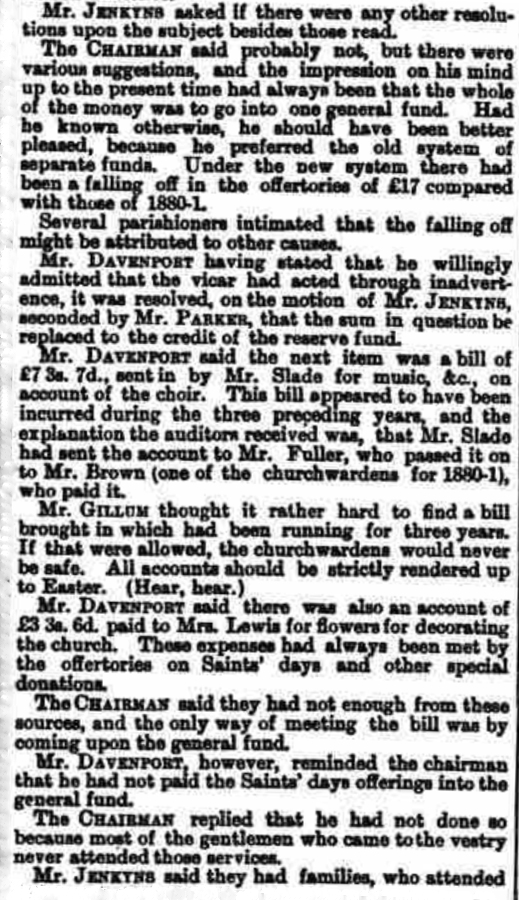
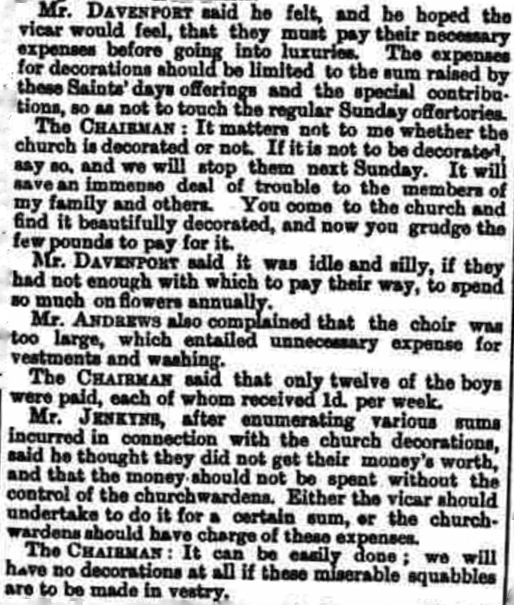
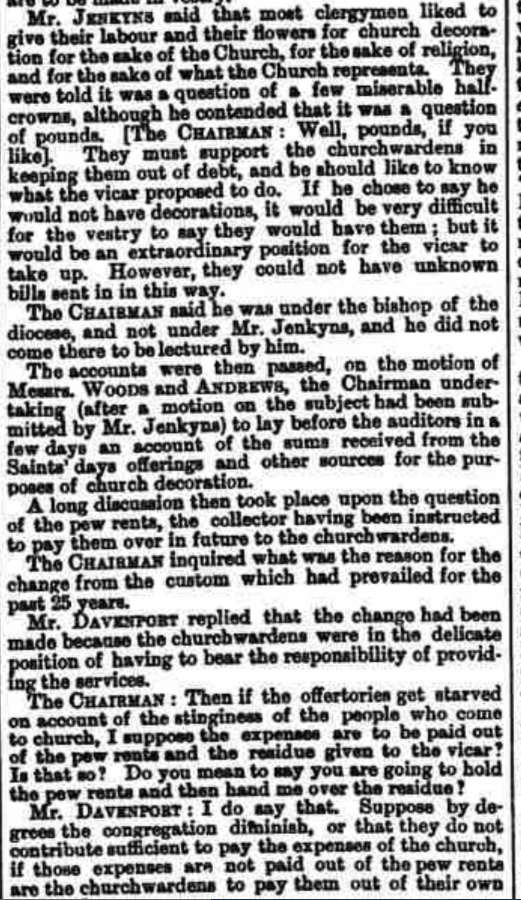
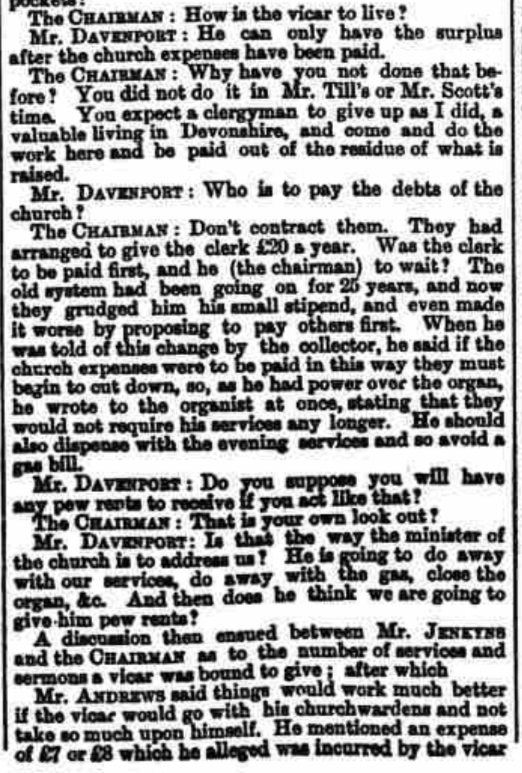
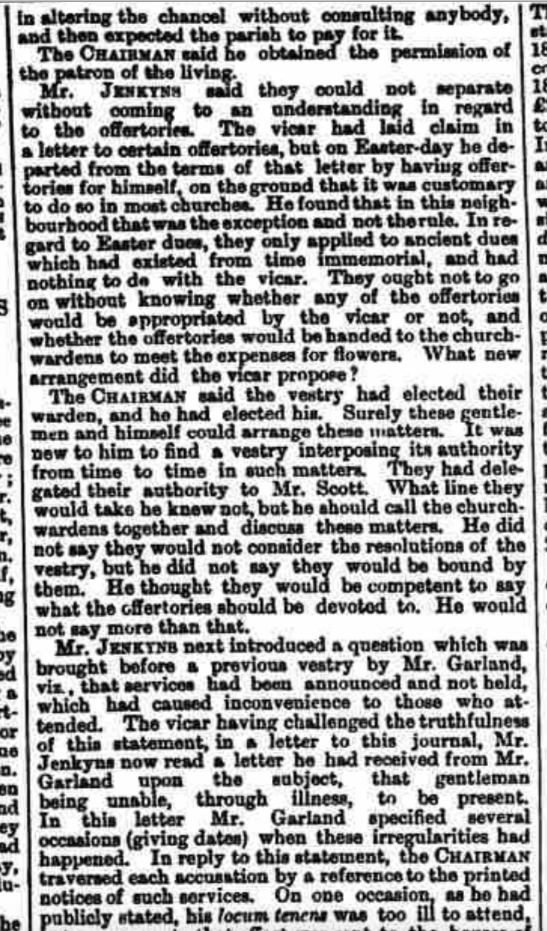
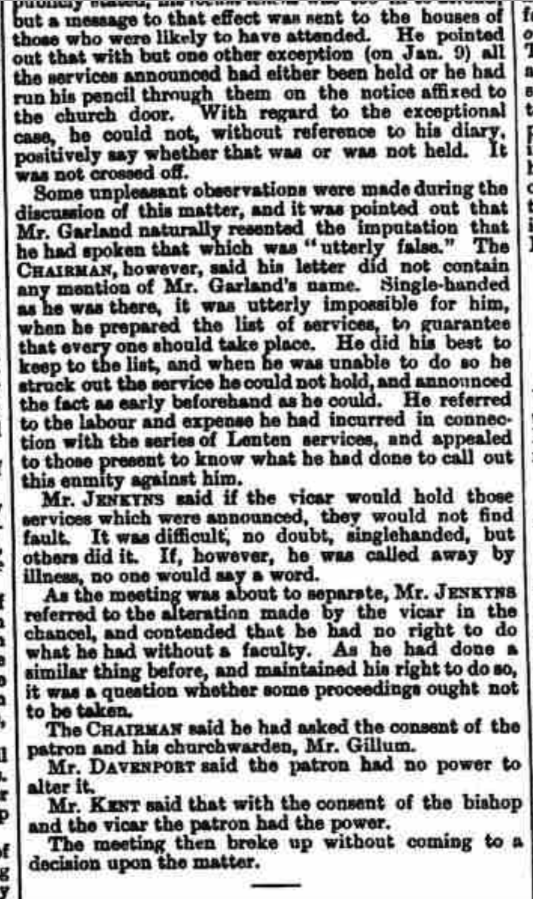
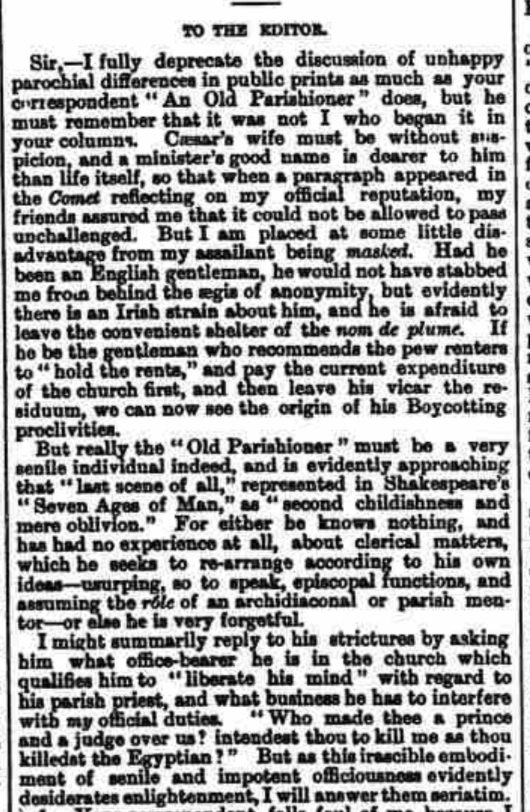
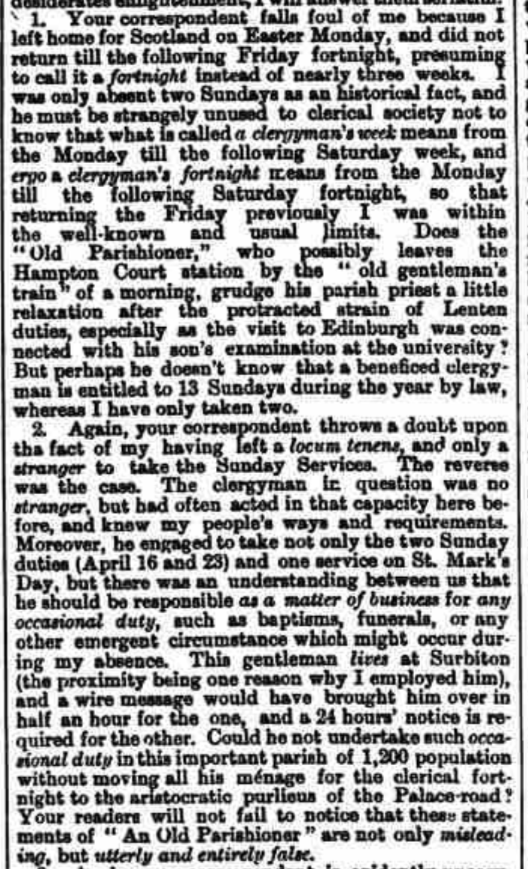
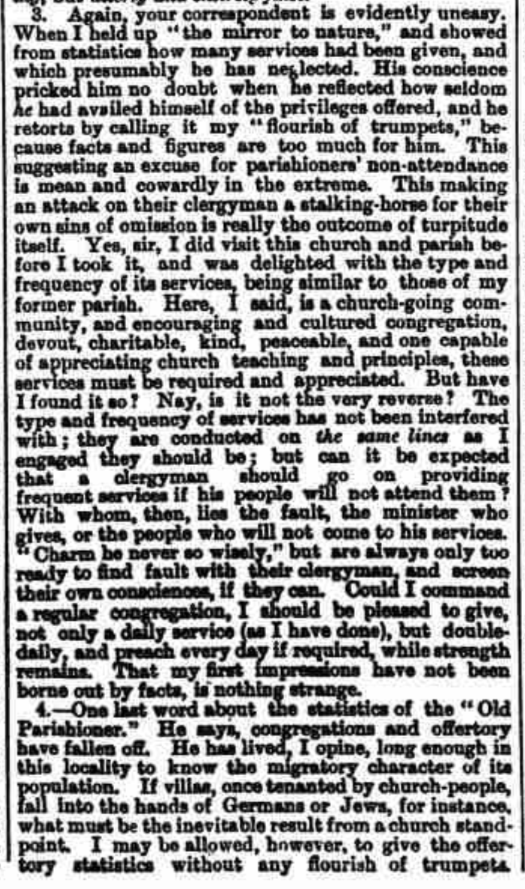
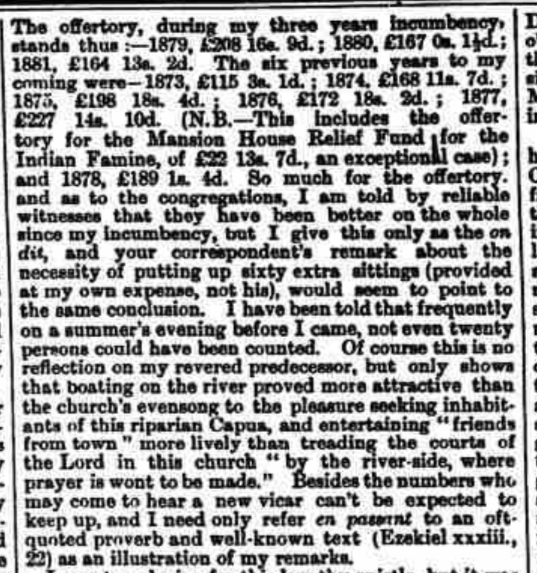
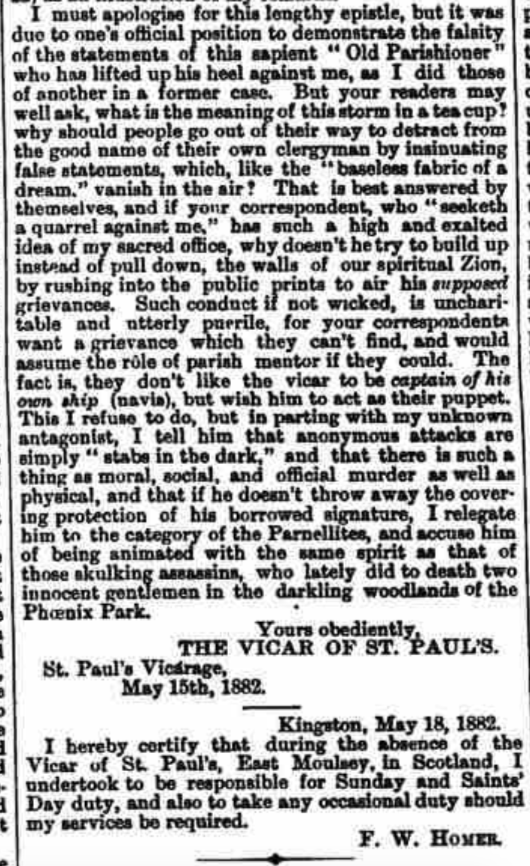
Surrey Comet May 27th. 1882
THE VICAR OF ST. PAUL’S AND HIS PARISHIONERS.
TO THE EDITOR.
Sir,—l regret having to ask a space in your columns once more, but the vicar’s
remarkable letter in your last issue compels me to state publicly (as I have
done privately to him) who the “Old Parishioner” is, or, as he put it, “throw
away the covering protection of his borrowed signature; but although I wrote
a very temperate letter under that signature, there was no real disguise as
to the author. It was well known throughout the district, and It appeared to
me impossible that the vicar should have been ignorant of my identity, as
all the latter part of my letter was simply a verbatim repetition of arguments
I had previously addressed to him personally in vestry, to say nothing of
his allusion, “If he be the gentleman who recommends the pew renters to
hold the rents, &c.,” which he knew I had done, or rather had advised the
wardens, to hold them until the vicar declared his intentions to the disposition
of the offertories. No one would more strongly than myself deprecate
personal attacks made anonymously, either privately or in print,
nor would you permit your columns to be so used; but surely it is well
recognised that if letters are published containing statements affecting
parochial matters, parishioner or -ratepayer under those designations may
criticise or traverse those statements (of course sending you his name and
address) without justifying the terrible denunciations contained in Mr. Fuller’s
letter, such “ stabs in the dark,” “ moral, social, and official murder,” “ with
the spirit of those skulking assassins,” &c. If this were not permitted,
much useful information would be withheld and fictions pass for facts,
as many persons may be able to impugn or throw light on a subject in
dispute, but who, like the “Old Parishioner,” shrink from seeing their
names in print. But now to the point. What did these murderous stab,
at the vicar's moral, social. and official life consist of. I I first expressed
the regret we all felt at the tone of his previous letter (and I am glad he
does not take exception to that). Then, after differing with him as to
the length of his absence, I continued that "as his allusion to his
locum tennis during that time" might lead people to believe he "had left
a minister in charge, I must state that was not so" . That, sir, was " the
head and front of my offending.” He replied in language all his own,
"that these statements of 'An Old Parishioner’ are not only misleading.
but utterly and entirely false." Very strong words these; but l am bold
enough to repeat that statement over my own signature . I say there
was no minister in charge under any ordinary or reasonable sense
of such a provision and that is the issue between us. And now let us
see how Mr. Fuller justifies giving me the lie direct. He says
(alluding to Mr. Homer, of Surbiton, who took Sunder services),
“there was an understanding between us” that he would be
“ responsible as a matter of business for any occasional duty, such
as baptisms, funerals &c.; that a wire message would have brought
him over in half hour for the one, and 24 hours notice is required
for the other.” And the Vicar has obtained a certificate from
Mr. Homer. stating that in addition to the Sunday and Saint day
duty, he undertook any occasional duty should his services be
required, and there the Vicar stops and thinks he has satisfactorily
disposed of the “Old Parishioner" He does not seem to see that
this private arrangement was quite futile, might as well never
have been made if it were not communicated to the church
officials, and especially to the parish clerk, to whom, by a notice
which has always hung in the church porch ( and as is customary
in all parishes), applications for church offices, baptisms, funerals,
&c., are to be made; but no such information was given, The clerk
(a most trustworthy man who has held the office since the church
was consecrated) assured me positively that no information or
instructions were given him in respect of such an arrangement,
that he never heard a word about it from the Vicar, Mr Homer or
anyone else, and, as he naively added, “How was I to know
Mr Homer would come, or how could I wire him when I never
knew where he lived, and don’t know now?” Nor can I ascertain
who does now Mr Homer’s address. Now can it be said that an
understanding as above, but not communicated to the only person
who could make use of it, was “leaving a minister in charge” and
justify the Vicar denouncing my statement as utterly and entirely
false! I think not.I had in this letter commented somewhat strongly
on that undertaking, the unpleasant construction that might be put
upon it; also on other objectionable statements and language
used in Mr. Fuller’s letter. But since writing I have received a
letter from him, wherein to my great surprise, and I think the
surprise of the whole parish, be assures me "he had not the
slightest idea of my identity with the * Old Parishioner," and that
having now heard this from me “wishes to retract everything of
a personal character.” I, of course, accept this assurance in
the spirit in which I believe it to be written, and have tnerefore
confined my letter to justifying my character from a public
imputation of truthfulness, for I feel it an honour to be thought
well of by those among whom 1 have lived for 20 years,
and the charges against me were serious, but which I think
they will now feel I have satisfactorily refuted, and I thank
them sincerely for the strong and unanimous feeling of
indignation they have expressed at the language they, with
myself, believe to nave been levelled at me. And now I trust
further unpleasantness may cease, only adding that should
the vicar at any future time address you on his parish matters,
I trust he will not permit himself that license of personal
vituperation, which can but recoil on his own head, and lessen
the respect dueto him as a minister of our church.
I am, sir. yours obediently,
The “Old Parishioner.”
WM. DAVENPORT.
East Molesey, 24th May, 1882.
TO THE EDITOR.
Sir,- As the writer of the letter signed “An Old Parishioner” has divulged
his name this day to me, and announces his intention of stating it publicly
in next Saturday’s Surrey Comet, I feel it only right to say that I hadn’t
the slightest idea who inspiredits authorship, and consequently there
could have been no personal feeling or animosity in what I wrote.
I simply looked upon your correspondant as the “apotheosis” of a
querulous and sectional, though I hoped temporary, discontent, and
my object was to demolish his wild and reckless statements, as well
as to traverse his charges by rebuttingevidence, ”What’s Hecuba to him,
or he to Hecuba?” The letter was written, as your readers will see, on
Monday, May 15th, before the vestry meeting, so that that meeting
neither suggested its “topic,” nor stimulated its “animus.”
I forgot to add that my family were in residence during my absence at
the vicarage, i.e. the official residence of the parish priest, so that if
anyone had applied here,which was the proper place, for occasional duty,
it would have been provided by my locum-tenens (Mr. Homer, of Surbiton),
who was virtually in charge, to whom communication would have been
immediately made. My family would not leave for Brighton- though
indisposition necessitated their removal as soon as possible-
till my return from Scotland at the end of the fortnight to prevent accidents,
and to attend to anything requiring attention. But no one, no parishioner,
did apply as a matter of fact. My churchwarden (Mr. Gilum) and clerk,
also knew who was acting as my locum-tenens.I trust this will be final
and suffficient, and I don’t wish to write again, but as one highly placed
in the Church wrote me three years ago,when I came here,
“Suburban flocks are notoriously murmurers”.
Your obediently,
THE VICAR OF ST PAUL’S
ST PAUL’S VICARAGE, MAY 23, 1882
Surrey Comet May 27th. 1882 (Editorial)
KINGSTON, SATURDAY, May 27, 1882.
It is impossible to read the report of the Vestry Meeting at East Molesey,
and the letter of the Rev. Morris Fuller, which appeared in our issue of
last week, without distress. As a parochial quarrel, the dispute between
the vicar of St Paul’s and his parishioners, forms a miserable episode,
representing much unkind and even bitter feeling, unredeemed by any
righteous contention for principle or conscience That there are faults
on both sides, everyone must admit The tone of the vicar’s remarks at
the Vestry, and the style of his letter, are scarcely such as to command
sympathy or respect. It would have been well had the reverend
gentleman exercised the golden virtue of silence; or if he must have
spoken, to have remembered the wise old proverb that "soft answer
turneth away wrath” Not that we can altogether blame the Rev. Morris
Fuller for experiencing some feelings of irritation; for his patience was
sorely tried by the petty disputes at the vestry, over money matters.
In principles, in the frequency of services, in the ornate and ritualistic
style of the church decorations, the vicar fairly represented, we believe,
the general wishes of the church-going people of Kent Town. Much
seems to be expected from him in the way of duty, and in the observance
of Saints’ days, and much in the way of choral services and floral
decorations; and it must be owned that the vicar does not appear
to have stinted them in these respects, for the printed lists of matins
and vespers are something appalling. It was scarcely generous then,
to quibble about the cost of the flowers, or dispute acrimoniously
whether a few pounds should, or should not, have been transferred
from one offertory to supply the deficiencies of another. These are
little matters of accounts which, surely, the practical sense of the
churchwardens might easily have rectified without fuss or scandal
We sincerely trust that Mr. Davenport’s letter, which we print to day,
will end the unseemly strife; that concessions will be made on both
sides; that a more kindly and courteous spirit will be exercised ; that
the "priest" will be a wee bit less overbearing, and the people a little
more generous; and, above all, that the language and manners of
the "gentle life" may be, henceforth, more carefully observed by the
vicar and parishioners of St Paul’s.
This episode must have been the last straw for Morris and made his
remaining time very difficult for him until the Surrey Comet announces
on May 24th 1884:
DEPARTURE OF THE VICAR OF ST. PAUL'S. EAST MOLESEY,-
The Rev. Morris Fuller has, we are informed, arranged an exchange
of livings with the Rev. George Edmund Tatham , M.A. rector of
Ryburgh Magna and Parva, Fakenham, Norfolk and rural dean.
We understand that Mr Fuller will officiate at St. Paul's to-morrow
for the last time during his ministry.